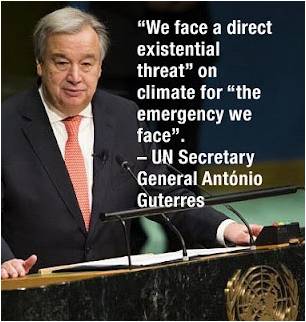Reminder: A New Government is Not a Solution to the Climate Emergency – Action is Required!

Since Australia’s 21 May national election, I’ve been too busy working on a series of articles on the genesis of the ‘Teal Tsunami’ of climate friendly community independents that is transforming Australian government to post much else. However, replacement of the COALition Government whose solution to the climate emergency was denial by one that at least accepts that the emergency is real still does not solve the problem. Today’s post is a reminder that effective action becomes more urgent with every day that passes.
By David Spratt, 10/08/2022 in Climate Code Red
High-profile paper on “catastrophic” climate impacts echoes our “What Lies Beneath” analysis on fat-tail, existential risks and IPCC reticence, published four years ago
Last week, just as a new paper on catastrophic climate risks was hitting the media, I received an email:
“It would appear some scientists are now, finally, openly speaking about what you yourself have long been describing as the ‘high end’ or ‘fat tail’ risks associated with climate change and want UN scientists to look into the risks of catastrophic climate change. Here’s the link to the article on the BBC website… On two occasions when reading this article I did punch the air on your behalf; when it mentions the need for more emphasis on tipping points and for the IPCC to produce a special report on catastrophic climate failure..”
It wasn’t the only one.
So what does this new paper say? Well, in essence, some very similar things to our report What Lies Beneath: The underestimation of existential climate risks.
Read the complete article: http://www.climatecodered.org/2022/08/high-profile-paper-on-catastrophic.html
As early as 2016 based on my backgrounds in evolutionary biology and technology, I was beginning to publish the same message. If we humans don’t stop and reverse global warming we face near-term (i.e., in less than a century) global mass extinction, including the extinction of our own species and families. See
- 18/08/2016: The End of Exponential Growth ― Our Species’ Existential Risk;
- 06/09/2016: The Angst of Anthropogenic Global Warming: Our Species’ Existential Risk;
- 21/02/2017: Are Humans Facing a Climate Emergency — Evidence and Actions;
- 26/04/2017: Is this the Start of Runaway Global Warming?
- …
- 20/12/2021: Some fundamental issues relating to the science underlying climate policy — The IPCC and COP26 couldn’t help but get it wrong.
And, as if this wasn’t enough to highlight the reality of the dangers we face from inaction, the bulk of my posts here in Climate Sentinel News present the ever growing evidence that the impacts we are already facing from the climate emergency are increasing in magnitude, frequency, and death tolls. We are clearly approaching a physical point of no return, beyond which we can do nothing to escape the one-way road to mass extinction.
Parliament needs to declare a state of emergency and begin total mobilization to stop all carbon emissions and begin works to scrub excess carbon from the atmosphere. The latter will require more research, but the most promising technologies I can see from my wide general knowledge all involve either:
- biological sequestration in the oceans, especially fertilizing ocean ‘deserts’ with iron to grow algae and farming of zooplankton and fish to take the captured carbon to the sea floors along with their deaths; or
- reflecting solar radiation away from our planet, perhaps using carbonate aerosols (e.g., chalk dust), which in addition to reflecting light will when it falls out help neutralize excess acidity of the oceans produced by its absorption of excess CO2.
PARLIAMENTARIANS NEED TO BEGIN ACTING NOW, AND VOTERS IN UPCOMING STATE ELECTIONS NEED TO ELECT MORE CLIMATE FRIENDLY COMMUNITY INDEPENDENTS TO RE-ENFORCE AND EXECUTE CLIMATE ACTION AT THE LOCAL LEVEL